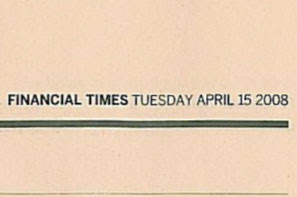
Tuesday 29 April 2008
Professors predict changes in approach to risk management

Tuesday 22 April 2008
Barclays Wealth, London, is the destination for recent Zurich doctoral graduate

Preferring the conceptual diversity and lateral mindset of wealth management to a traditional role in asset management, recent graduate Dr Benoit Metayer has been appointed as an associate director at Barclays Wealth in London.
Benoit (pictured), whose doctoral work was supervised by Professor Rajna Gibson in Zurich, is now working in a team of 13 Quants. 'In order to serve clients, the team develops cutting-edge methods in four major areas - risk profiling, portfolio optimisation, machine learning and the pricing of structured products,' explained Benoit.
‘From a quantitative point of view, the role is really exciting as we often have to provide sophisticated solutions in a completely bespoke way’, he said, pointing out that his employer is taking a highly scientific approach to the investment process.
‘In the current context of difficult markets, Quants bring significant value by helping private bankers and advisors to deal with clients more actively, accurately and efficiently,' he said.
Monday 21 April 2008
Zurich Doctoral Dinner 2008

As you can see from the photo gallery of the event, there was lively discussion throughout the evening and a presentation by former CEO of the Zurich Stock Exchange, Dr Richard Meier, charting the history of automated trading in
Saturday 19 April 2008
Letter by Professor Barone-Adesi in Financial Times

The Financial Times has published a letter by SFI Professor Giovanni Barone-Adesi in the April 15th edition of the paper in which he comments that the ‘current debate on the adequacy of Basel II [should pay] more attention to incentives and education rather than to more regulation’.
Barone-Adesi’s comments follow recent statements by Basel II chairman Nout Wellink that banks should adopt more ‘forward looking approaches to assessing, managing and holding adequate capital for risks’.
Echoing Baroni-Adesi’s sentiments was another letter arguing that Wellink's statement reflects a ‘continued obsession with regulatory capital to the exclusion of a focus of what really goes wrong.’
Barone-Adesi calls for an improvement in ‘risk culture’, including better education for banking directors and managers in the complex risk measures proposed by the Basel II directive.
Tuesday 8 April 2008
SFI managing director professor Danthine interviewed about UBS

Professor Jean-Pierre Danthine has given an interview with Philippe Gumy of Le Temps about news of further calls for external capital at the Swiss bank UBS.
He emphasized UBS's capital sufficiency, quoting Swiss Federal Banking Commission spokesperson Alain Bichsel that "Internationally, UBS is very well capitalized and far above the average".
Danthine highlighted the persistent mistrust between banks at the current time, and the impact that this is having on the functioning of interbank loans.
Indeed, Danthine believes that the level of interdependence between banks worldwide is a key issue. He spoke about how global regulators such as the Bank for International Settlements are actively considering this issue as they develop future policy on bank capital requirements.
Sunday 6 April 2008
International researchers meet to discuss finer points in quantitative finance

With presentations by researchers from England, Austria, Germany and France, as well as the major finance research centres in Switzerland, the Doctoral Quantitative Finance Day is a boutique international event for card-carrying Quants.
Doctoral students, finance faculty and financial practitioners arrived to fill a seminar room at the Swiss Banking Institute at 9:30 am on Saturday April 5th for the day long workshop.
The workshop is informal with 10 out of the 30 or so attendees making presentations on their own research. Powerpoint presentations are sprinkled with simulations run live from R-scripts and Mathematica.
The workshop is organized by doctoral student Miret Padovani, Swiss Banking Institute, and sponsored by NCCR Finrisk, the Swiss Structured Products Association and EFG Financial Products.
I've posted some pictures taken at the event here.
Wednesday 2 April 2008
Lessons from the banking crisis


The Corriere del Ticino has published a commentary by Swiss Finance Institute Senior Chair in Finance Professor Giovanni Barone-Adesi, in which he describes the limitations of global banking regulation and how these limitations contribute to the ongoing turmoil in the world financial markets.
